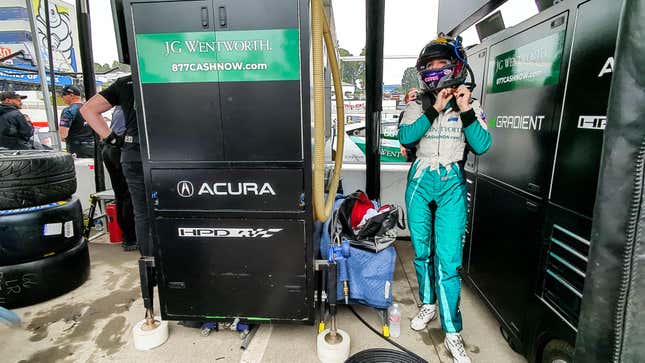
After qualifying for IMSA’s 2023 Petit Le Mans finale, I sat down to speak with Sheena Monk of Gradient Racing — one of the few race teams in the sport with a primary all-woman lineup — about how the impact her gender and presentation have had on her career. With a set jaw and fire in her eyes, she told me, “Oh, this is such a relevant moment to have this conversation. I have a lot on my mind.”
“Normally I would say that [women] get treated pretty fairly in racing,” she said. “I’m a big proponent of treating everyone with respect, because they’ll treat you the same way — and that’s generally the case most of the time, independent of your gender.”
But Monk’s mindset was in a different place after qualifying for the 10-hour race. She hadn’t been the one behind the wheel attempting to set the fastest time; that distinction had gone to her teammate Katherine Legge. However, Monk sat on the pit wall for the session, which gave her a front-row look at what transpired after the checkered flag.
“Katherine got out of the car after qualifying and was called a cunt to her face multiple times,” Monk stated. “To me, it’s one thing to call someone an asshole — for someone to call Katherine that. But the gendered nature of that word… it’s so disappointing to see that behavior from a respected team in the paddock with a well-known company on the side of their car.
“Ironically, last year, that same individual got in my face, nose-to-nose, yelling at me so loud that he was spitting in my face at Mid-Ohio last year Obviously he’s a repeat offender.”
Going into that conversation with Monk, I knew that she could be a tough nut to crack when it comes to talking about gender, if only because Monk is often adamant that she isn’t treated differently than any of her peers. Had I spoken to her even one hour prior, we likely would have had a very similar conversation to the one Monk has had with other journalists. But the nature of timing allowed for a different kind of introspection.
“In those instances where it becomes obvious that someone thinks negatively of you, how does that impact you?” I asked.
Monk, ever the laser-focused competitor, responded, “It’s funny, because I think it just riles us up even more. Gender aside, you have to have such thick skin to be in racing because you’re on the knife edge all the time. Mistakes happen, but you have to move on quickly. It’s honestly so shitty that someone would even say that [to Katherine], but within the last 30 minutes, we’ve kind of turned it into a joke. That person who said that to her is leaving the sport because he can’t hack it. And guess what? We’re still here.”
Monk and Legge were joined by Marc Miller for Petit Le Mans, but for much of the season, Gradient’s Acura NSX GT3 Evo22 was solely contested in events by two women. Much attention has been drawn to the slow growth of female competitors entering racing events in the past few years, but many times, those women come as one-offs, tucked comfortably on equal footing next to their male peers. It’s still incredibly rare for a team to field two women side by side. In 2023, with the exception of Gradient’s primary duo, only the Iron Dames race team competed in endurance events with an all-woman lineup.
But while racing is a numbers game, and while the numbers of women in motorsport are still far fewer than men, Gradient’s team owner Andris Laivins shed some light on what it actually takes to get two women competing alongside each other on the same team.
“People ask how we chose two women to pair up for our driver lineup, but that’s not how this business works,” he said. Instead, the right pieces simply came together at the right time; Laivins didn’t so much seek out a two-woman lineup as he did simply pursuing an opportunity that arose.
“This entire sport is white dudes, so I had a huge amount of eagerness to get this deal done,” he admitted. “This is something I care enough about that I’ll bend over backwards and pick up the phone to get as much support as possible. I’m personally interested in seeing this opportunity go somewhere — but I’m not a hero or anything. It wouldn’t have happened if these factors hadn’t come into play in this one random year. It was just the most interesting path to take with the cards we had on the table.”
At the end of the day, the landscape is dramatically changing for the women who aim to be part of motorsport — and for the better. Support for diversity initiatives has grown as it becomes clear that women are just as capable of racing as men. One weekend with Gradient Racing showed just what challenges still remain, however, as we work toward a more inclusive — and competitive — world.